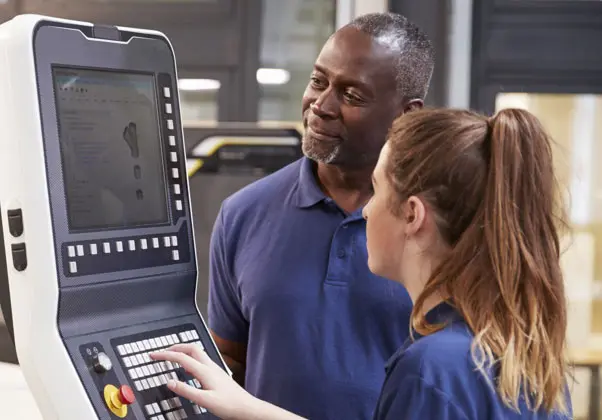Advanced Manufacturing Pathway
Love creating?
Does your student love working with their hands and creating things? Do they help your family with home improvement projects? Are they fascinated by how factories churn out just the right parts for their tablet or your new car? If so, they might be perfect for a career in advanced manufacturing!
What is Advanced Manufacturing?
Why do we call it “advanced?” Because manufacturing has gone high-tech and workers now need top-notch computer and technology skills and an eye for detail and quality.
Machinists keep factories humming by turning out precision metal parts—everything from the titanium screws in medical devices to the steel bolts used in construction projects. Boiler operators keep the lights on and the heat and air-conditioning at full blast in our schools, hospitals, and other large buildings. And industrial operations managers (also known as plant managers) keep factory floors coordinated and efficient.
The Stride Career Prep* Advanced Manufacturing Pathway helps students prepare for these jobs, which are indispensable to our health, comfort, and safety—and to the efficient running of our economy.
Gain real-world skills through project-based learning.
Stride Career Prep has implemented project-based learning (PBL) to hone students’ problem-solving, communication, critical thinking, and team collaboration skills. Students who choose this pathway gain a broad understanding of manufacturing tools and processes and safety fundamentals. It also prepares them to take the exams for the necessary credentials to head directly to a job.
Our Advanced Manufacturing Pathway Curriculum in Detail
All our students take the core courses required for high school graduation in their state. The chart below shows the additional classes students take as part of the Advanced Manufacturing Pathway. You can see the rest of the curriculum by viewing the full course list.
CAREER EXPLORATION COURSES
These courses provide an opportunity for students to gain insight into potential careers.
CAREER FOUNDATION COURSES
These courses are building blocks that prepare students for more specialized pathway courses.
CAREER PREPARATION COURSES
These courses prepare students for industry-recognized certification exams.
Manufacturing Explorations
Intro to Advanced Manufacturing
Technician Safety & Fundamentals
Manufacturing Tools & Processes
Get credentialed.
In a world where competition for jobs, pay increases, and academic success continues to increase, certifications provide a credible, third-party assessment of a student’s skills and knowledge of a given subject. The Advanced Manufacturing Pathway curriculum prepares students to take these industry-recognized certification exams:**
CAREER SKILLS CERTIFICATIONS
These baseline certifications indicate students have mastered domain-specific, entry-level job skills.
NOCTI Manufacturing Technology
Get ahead of the competition.
We encourage students to jumpstart the job search by helping them create a professional résumé, cover letter, and profile on Tallo, the leading professional networking platform for Gen Z. Plus, they connect virtually to working business professionals and entrepreneurs through Nepris.***
Find a school near you that offers the Advanced Manufacturing Pathway
Stride Career Prep programs with the Advanced Manufacturing Pathway are available in our tuition-free K12-powered, fully accredited, public online schools in the following states:
LOUISIANA
Don’t see your state? Check out the tuition-based option here in the Advanced Manufacturing Pathway. There are also tuition-free options in related fields like heavy machine operations.
Choose a career. Prepare for the future.
Students in this pathway can prepare for a wide variety of careers in the field of manufacturing, including:
Automotive service technicians and mechanics inspect, maintain, and repair cars and light trucks. Although technicians often identify and fix automotive problems with computers, they commonly work with greasy parts and tools, sometimes in uncomfortable positions.
2021 Median Salary
$46,880
Expected Job Growth Rate for 2020–2030
Little change
Typical Entry-Level Education
High school diploma or GED and a postsecondary nondegree
This data reflects the information available from the Bureau of Labor Statistics, U.S. Department of Labor, Occupational Outlook Handbook on June 29, 2022. To learn more about this occupation, visit bls.gov/ooh/installation-maintenance-and-repair/automotive-service-technicians-and-mechanics.htm.
Automotive service technicians and mechanics inspect, maintain, and repair cars and light trucks. Although technicians often identify and fix automotive problems with computers, they commonly work with greasy parts and tools, sometimes in uncomfortable positions.
2021 Median Salary
$104,150
Expected Job Growth Rate for 2020–2030
Slower than average
Typical Entry-Level Education
Bachelor’s degree
This data reflects the information available from the Bureau of Labor Statistics, U.S. Department of Labor, Occupational Outlook Handbook on June 29, 2022. To learn more about this occupation, visit bls.gov/ooh/management/industrial-production-managers.htm.
Stationary engineers and boiler operators operate engines, boilers, and related equipment for the safe and efficient operation of air-conditioning and refrigeration equipment, turbines, generators, pumps, and compressors for large commercial (e.g., hospitals, universities) and industrial facilities. They start up, regulate, repair, and shut down equipment. They monitor meters, gauges, and computerized controls to ensure that equipment operates safely and within established limits. They use sophisticated electrical and electronic test equipment to service, troubleshoot, repair, and monitor heating, cooling, and ventilation systems. Shift work is often required.
2021 Median Salary
$63,500
Expected Job Growth Rate for 2020–2030
Average
Typical Entry-Level Education
High school diploma or GED and extensive on-the-job training
This data reflects the information available from the Bureau of Labor Statistics, U.S. Department of Labor, Occupational Outlook Handbook on June 29, 2022. To learn more about this occupation, visit bls.gov/ooh/production/stationary-engineers-and-boiler-operators.htm.
General maintenance and repair workers fix and maintain machines, mechanical equipment, and buildings. They could work at any number of indoor or outdoor locations and often carry out many different tasks in a single day.
2021 Median Salary
$43,180
Expected Job Growth Rate for 2020–2030
Average
Typical Entry-Level Education
High school diploma or GED
This data reflects the information available from the Bureau of Labor Statistics, U.S. Department of Labor, Occupational Outlook Handbook on June 29, 2022. To learn more about this occupation, visit bls.gov/ooh/installation-maintenance-and-repair/general-maintenance-and-repair-workers.htm.
Quality control inspectors are responsible for ensuring a wide variety of manufacturing products meet quality standards, including foods, textiles, clothing, glassware, motor vehicles, electronic components, computers, and structural steel. They typically monitor production, test products to ensure that standards are met (such as size, weight, color, taste, strength, or performance standards), accept or reject items based on quality inspections, and recommend adjustments to the manufacturing process when defect rates exceed tolerances.
2021 Median Salary
$38,580
Expected Job Growth Rate for 2020–2030
Declining
Typical Entry-Level Education
High school diploma or GED
This data reflects the information available from the Bureau of Labor Statistics, U.S. Department of Labor, Occupational Outlook Handbook on June 29, 2022. To learn more about this occupation, visit bls.gov/ooh/production/quality-control-inspectors.htm.
FAQs
Many manufacturing careers do not require a college degree, including automotive technicians, general maintenance workers, and quality control inspectors. Some jobs, like power plant operators and boiler operators, require extensive on-the-job training. Buyers and purchasing agents typically have a bachelor’s degree, and purchasing managers must also have a few years of work experience.
You can prepare for a career in advanced manufacturing while still in high school by taking manufacturing tools and processes and technician safety courses. Learning to work in a team, communicate, compromise, and share credit are also valuable skills to develop. Our project-based curriculum helps students develop these valuable real-world skills.
*Stride Career Prep is a program for grades 9–12. Some schools offer career exploration in middle school.
**Many Microsoft®️ Office certificates can be earned after completing one course. Other certificates require more classes to be better prepared, and students who participate in the program for at least two years will have further preparation for certification testing.
***Opportunities vary by school; please visit your school page or check with your school counselor.















